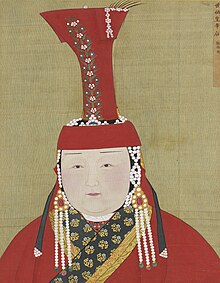Chabi
| Empress Chabi | |||||
|---|---|---|---|---|---|
 Portrait by Araniko | |||||
| Khatun of Mongols | |||||
| Tenure | 1260 - 1281 | ||||
| Predecessor | Chübei Khatun | ||||
| Successor | Empress Nambui | ||||
| Empress of China | |||||
| Tenure | 1271 - 1281 | ||||
| Predecessor | Empress Quan | ||||
| Successor | Empress Nambui | ||||
| Born | 1225 | ||||
| Died | 20 March 1281 (aged 56) | ||||
| Spouse | Kublai Khan | ||||
| Issue | Zhenjin, Crown Prince Manggala, Prince of Anxi | ||||
| |||||
| Clan | Khongirad | ||||
| Father | Anchen of the Onggirat tribe | ||||
| Religion | Buddhism | ||||
Empress Chabi (Mongolian: Чаби хатан,ᠴᠠᠪᠦᠢ ᠬᠠᠲᠤᠨ ;Chinese: 察必皇后, c. 1225[1]–1281) was a Khongirad empress consort of the Yuan dynasty in China, married to Kublai Khan. As such, she was the first Mongol empress of China.
Life[]
She was born around 1225 to Alchi Noyan, brother of Börte from Khongirad tribe and his otherwise unnamed, posthumously called wife Princess Jining. She married to Kublai in 1239 as his second wife and bore him four sons later.[2] She was an important political and diplomatic influence, especially in pleasing the Chinese masses through reconciliation with Confucianism. She was compared to Börte through for her reputation.[3] She was described as extremely beautiful and charming by Rashid al-Din.[4]
Möngke Khagan died in 1259 while Kublai was campaigning against the Song Dynasty. She warned her husband of advancements of Ariq Böke beforehand.[5] After conquest of China, she suggested a better treatment of the north Chinese imperial family, namely Empress Quan in 1276. She also introduced new court fashion in form of hats. Chabi also promoted Buddhism in the high levels of government fiercely. She also named her child under influence of Buddhism.[2] She mediated religious disputes between Kublai and Phagpa, and supported the latter both economically and politically.[5] She was also patron of Zangpo Pal.
She died on 1281, probably arranging her niece Nambui to marry Kublai afterwards. She was posthumously renamed Empress Zhaorui Shunsheng (昭睿順聖皇后) by her grandson Temür Khan.
Family[]
She had 4 sons with Kublai, all having unhealthy physique:
- Prince Dorji (b.c. 1240, d. 1263) — the director of the Secretariat and head of the Bureau of Military Affairs from 1261
- Crown Prince Zhenjin (1243 – 1285) — Prince of Yan (燕王)
- Manggala (c. 1249-1280) — Prince of Anxi (安西王)
- Nomughan (d. 1301) — Prince of Beiping (北平王)
In Popular Media[]
She was portrayed several times in TV series and movies:
- Eternal Happiness (2002) by Law Lan
- The Legend of Kublai Khan (2013) by Charmaine Sheh
- Marco Polo (2014) by Joan Chen
- Hojo Tokimune (2001) by Shurenhuar
Sources[]
- Stearns, Peter N.; Michael Adas; Stuart B. Schwartz; Marc Jason Gilbert (2011). "14 • The Last Great Nomadic Challenges: From Chinggis Khan to Timur". World Civilizations: The Global Experience AP* Edition (6th ed.). pp. 327–328. ISBN 0-13-136020-5.
- Jack Weatherford (2011). The Secret History of the Mongol Queens: How the Daughters of Genghis Khan Rescued His Empire Paperback. Broadway Books. ISBN 0307407160.
- "MONGOLS, CHRISTIANITY, NESTORIANS AND THE SILK ROAD". factsanddetails.com.
References[]
- ^ Biographical Dictionary of Chinese Women, Volume II:Tang Through Ming 618-1644: "Chabui, c. 1225-1281 (Mongol and Yuan dynasties). Was the most senior, although not the first, wife of Quibilai Khan (1215-1294)"
- ^ a b Atwood, Christopher Pratt (2004). Encyclopedia of Mongolia and the Mongol empire. New York, NY: Facts On File. p. 82. ISBN 0-8160-4671-9. OCLC 52901464.
- ^ May, Timothy (2016-11-07). The Mongol Empire: A Historical Encyclopedia [2 volumes]: A Historical Encyclopedia. ABC-CLIO. pp. 136–137. ISBN 978-1-61069-340-0.
- ^ Rashīd al-Dīn Ṭabīb, 1247?-1318. (1971). The successors of Genghis Khan. New York: Columbia University Press. p. 241. ISBN 0-231-03351-6. OCLC 160563.
- ^ a b Rossabi, Morris (2014-01-01). 12. Khubilai Khan and the Women in His Family. Brill. doi:10.1163/9789004285293_014. ISBN 978-90-04-28529-3.
- 1281 deaths
- Yuan dynasty empresses
- 1225 births
- 13th-century Mongolian people
- 13th-century Chinese women
- 13th-century Chinese people
- 13th-century Mongolian women
- 13th-century Buddhists